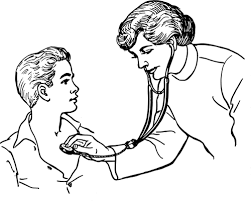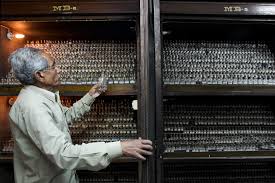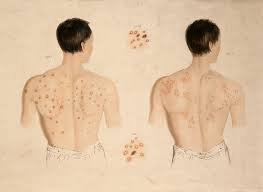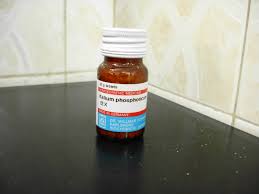Harry B. Baker, M.D., Richmond, Va.
In my experience malaria is by far the most frequent cause of facial neuralgia, especially where it is of the intermitting type. Very often the malaria may have been acquired years before, and entirely forgotten by the patient.
I have frequently had patients deny ever having had malaria, but on close questioning admit that they did have chills when a child, but that was thirty or forty years ago and could not possibly have anything to do with the present trouble.
Malaria has the faculty of lying dormant for almost any length of time, and for that reason it is very difficult to know when you have eradicated it, and I sometimes think that once thoroughly in the system it is doubtful whether it is ever entirely eradicated.
Of course most of the cases that we come in contact with have been treated with heavy doses of quinine and suppressed, and it is very possible that the neuralgias resulting later on are more drug symptoms than disease ones.
A very frequent malarial symptom is a frontal headache which is often mistaken for a sinus condition and sent to the specialist for treatment which does no good. I had an excellent example of this last fall when a former patient of mine who is now living in Cambride, Mass., developed a frontal headache which her physician there could not relieve. He wanted her to go to a specialist for sinus treatment, but she told him that she did not have any sinus trouble, that it was only malaria as she had it before. He had her blood examined and told her that it could not possibly be that. However, she did not believe him, but wrote to me an I was able to clear it up with a few prescriptions. She was pregnant at the time which probably caused the dormant trouble to light up.
Now if we select the similimum for the case we will probably clear up the neuralgia whether it is based on malaria, syphilis, or what not, but is a great satisfaction to know the cause of the trouble and patients like to know that also. In addition while any remedy in the materia medica may be indicated for any condition, still certain conditions are apt to fall in certain groups of remedies and a great deal of time is saved in that way.
I find that these facial neuralgias which are due to malaria are very apt to call for Arsenicum, Nux-v., Natrum muriaticum, China or Spigelia, Sulphur, Sepia, Kali-c. And some of the other deeper acting remedies are often needed. I have found Spigelia very frequently indicated in tic douloureux. I had a case of this some years ago in an old lady who when she came to me had been under opiates for three months, and in intense pain whenever they wore off. I stopped them at once and gave her Spigelia which relieved her pain and kept her in comfort as long as she lived, some two or three years. I mention this case because remedies will not always act so promptly when a patient has been doped for such a long time. I do not remember giving her any remedy but Spigelia for the facial condition. Of course I used several different potencies.
DISCUSSION
Chairman Dixon: the paper is open for discussion.
Dr. Green: Sometimes neuralgia seems to baffle all kinds of remedies that prescribed for it on the symptoms of the attack, and when we forget about it and prescribe for the chronic condition of the patient, the patient gets well.
I was discouraged about an old lady, a patient of mine, who had a terrible facial neuralgia on the right side. The pain in her jaw was so distressing that she could not swallow and ran down hill for lack of nourishment. The pain shot up into the temple region, and then to one part of her head, which became so sore that she couldn’t touch it. The whole right cheek was so sensitive that she couldn’t even wash her face.
I remembered that when she was a patient of mine three years before, I gave her Sulphur on her chronic symptoms with good results. Dose 10M. I haven’t repeated it, (this was a month ago) and now my patient is getting well.
Dr. Roberts: Mr. Chairman I was pleased to have Doctor Baker refer to the case of pregnancy will bring out old latent malaria. It may not come until after the delivery, but you will get some hair raising sign in these old latent cases of malaria after the delivery. They will shoot a temperature very quickly.
Another thing is the time when the homoeopathic remedy can be guaranteed, if it is carefully chosen, to eliminate the fundamental dyscrasia, that is found in a patient when they have once had a very severe malarial attack. I have repeated that several times, and after the first pregnancy and the delivery there is no more of the chronic malarial condition.
Dr. Boger: Mr. Chairman this idea of suppression is a monster of hideous mien. It takes on many phases; you can’t tell beforehand what phase it will take. I had that very well demonstrated not long ago. Within the past couple of years a woman aged 55 came to me with a very well-marked case of arthritis deformans, and a successful prescription in those cases is, as you know, very, very difficult. Aside from what the x-ray showed, her wrists were drawn back, and it was with a great deal of difficulty that she ascended the steps into my office. Under a few doses of Pulsatilla she seemed to make a little headway. She was satisfied with it but I was not. After a while I discovered that she had been born and raised in Missouri. I think she had a very had case of malaria as a child. I found out all I could about that, gave her a dose of Arsenicum, MM potency, and the improvement for five or six months now has been enormous, past all belief. She comes up the steps without any trouble at all, moves along very freely. Of course the old distortions are still there, but she is a happy woman where previously she was very much distressed nearly all the time.
Now, how much coming back nature can do in such cases is really wonderful. I had that illustrated not long ago in the case of a burn. A woman got her finger into potash and burned it almost down to the bone. The bone was practically in sight, and she went to an allopath who put on mercurochrome. It was not doing well at all. I took off everything put on a little Calcndulum, gave her a dose of Arsenicum, and today you can hardly find the seat of that burn.
As I say, you cannot tell how much restoration nature will do. Many years ago Dr. Haines of Indianapolis published a paper in which he claimed a finger, I think it was, had grown back.
Dr. Olds: A nose.
Dr. Boger: Nose – and showed the picture. I cannot substantiate what Dr. Haines said, but I am ready to believe a lot about restoration.
Chairman Dixon: if there is no further discussion, Dr. Baker will you close?
Dr. Baker: I will just mention one other case that came up just before I left home. This patient, when she first came to me several years ago, had patches on her legs like mercuric patches. Sulphur cured that up. Later on she developed a bleeding from the right breast. There was no malignant condition, just a bleeding from the right nipple. That cleared up with Crotalus horridus. Now she is complaining of trouble with her nose, she says she “smells” her nose, and that it gives an odor in the room. I don’t think it does give an odor in the room, but evidently she is sensitive to a peculiar condition there. I cannot see any pathology. I didn’t find out until just the day before yesterday that she hade had, when she was a child, what they call “yellow chill.” She was from Halifax County, in North Carolina. “Yellow chill” is probably malaria with symptoms very similar to those of yellow fever. At one time down there the mortality of yellow chill was 9.95% but they do a little better now. She said she had had three of those attacks, the first time they thought she was dead, the kidneys had ceased to act at all. They finally put her in a tub of hot water and she pulled through that attack. Evidently that was a blood condition – malignant malaria has knocked her blood into a cocked hat. It would be very interesting to get some blood studies on this case, but I don’t think it would really help me in treating it.
Question: Did she have much quinine?
Dr. Baker: She says they used to pour it into her hand and she would take It.
Question: Would that have any influence on the condition of the blood?
Dr. Baker: I think it is the malignant malaria that did that.





